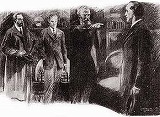“It was morning when I wakened, and it seemed to me that instead of coming out into a world of sanity I had emerged into some extraordinary nightmare. The African sun flooded through the big, curtainless windows, and every detail of the great, bare, whitewashed dormitory stood out hard and clear. In front of me was standing a small, dwarf-like man with a huge, bulbous head, who was jabbering excitedly in Dutch, waving two horrible hands which looked to me like brown sponges. Behind him stood a group of people who seemed to be intensely amused by the situation, but a chill came over me as I looked at them. Not one of them was a normal human being. Every one was twisted or swollen or disfigured in some strange way. The laughter of these strange monstrosities was a dreadful thing to hear.
“It seemed that none of them could speak English, but the situation wanted clearing up, for the creature with the big head was growing furiously angry, and, uttering wild-beast cries, he had laid his deformed hands upon me and was dragging me out of bed, regardless of the fresh flow of blood from my wound. The little monster was as strong as a bull, and I don’t know what he might have done to me had not an elderly man who was clearly in authority been attracted to the room by the hubbub. He said a few stern words in Dutch, and my persecutor shrank away. Then he turned upon me, gazing at me in the utmost amazement.
“ ‘How in the world did you come here?’ he asked in amazement. ‘Wait a bit! I see that you are tired out and that wounded shoulder of yours wants looking after. I am a doctor, and I’ll soon have you tied up. But, man alive! you are in far greater danger here than ever you were on the battlefield. You are in the Leper Hospital, and you have slept in a leper’s bed.’
“Need I tell you more, Jimmie? It seems that in view of the approaching battle all these poor creatures had been evacuated the day before. Then, as the British advanced, they had been brought back by this, their medical superintendent, who assured me that, though he believed he was immune to the disease, he would none the less never have dared to do what I had done. He put me in a private room, treated me kindly, and within a week or so I was removed to the general hospital at Pretoria.
“So there you have my tragedy. I hoped against hope, but it was not until I had reached home that the terrible signs which you see upon my face told me that I had not escaped. What was I to do? I was in this lonely house. We had two servants whom we could utterly trust. There was a house where I could live. Under pledge of secrecy, Mr. Kent, who is a surgeon, was prepared to stay with me. It seemed simple enough on those lines. The alternative was a dreadful one - segregation for life among strangers with never a hope of release. But absolute secrecy was necessary, or even in this quiet countryside there would have been an outcry, and I should have been dragged to my horrible doom. Even you, Jimmie - even you had to be kept in the dark. Why my father has relented I cannot imagine.”
Colonel Emsworth pointed to me.

“This is the gentleman who forced my hand.” He unfolded the scrap of paper on which I had written the word “Leprosy.” “It seemed to me that if he knew so much as that it was safer that he should know all.”
“And so it was,” said I. “Who knows but good may come of it? I understand that only Mr. Kent has seen the patient. May I ask, sir, if you are an authority on such complaints, which are, I understand, tropical or semi-tropical in their nature?”
“I have the ordinary knowledge of the educated medical man,” he observed with some stiffness.